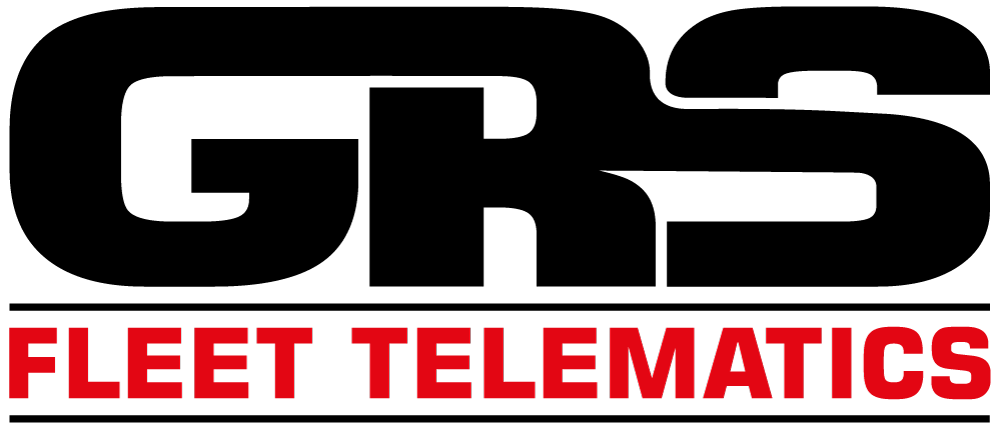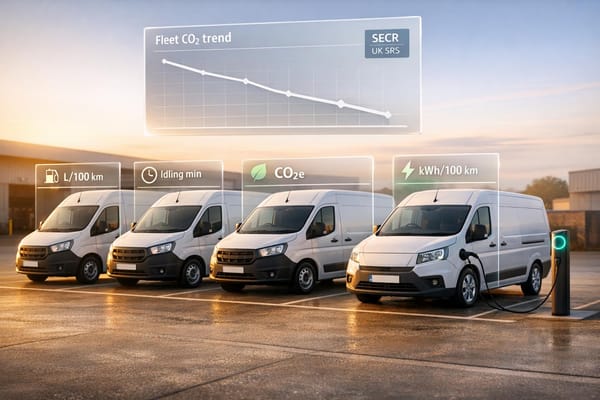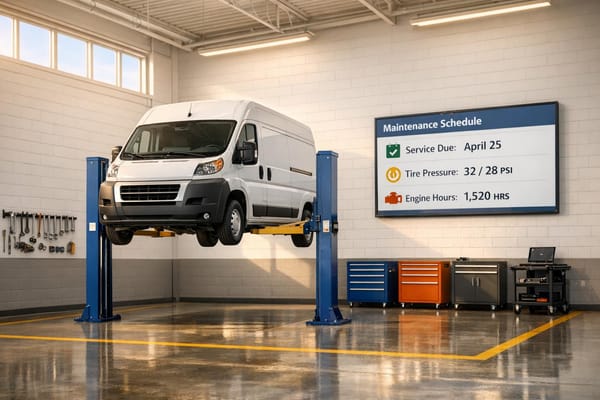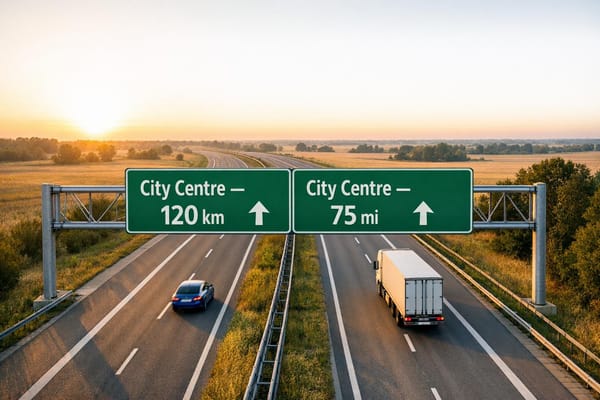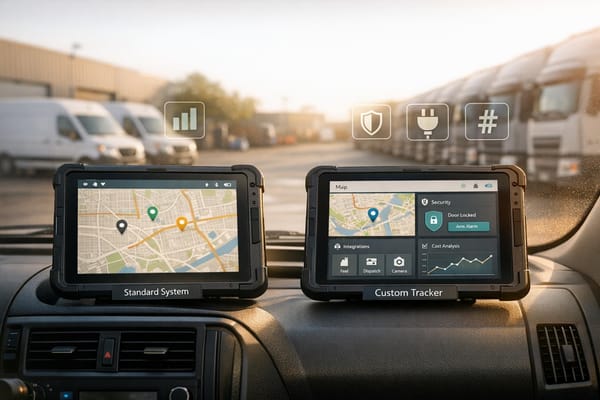Top AI Tools for Fleet Route Optimisation
Explore how AI tools are essential for optimising fleet routes in the UK, enhancing efficiency, compliance, and cost savings.
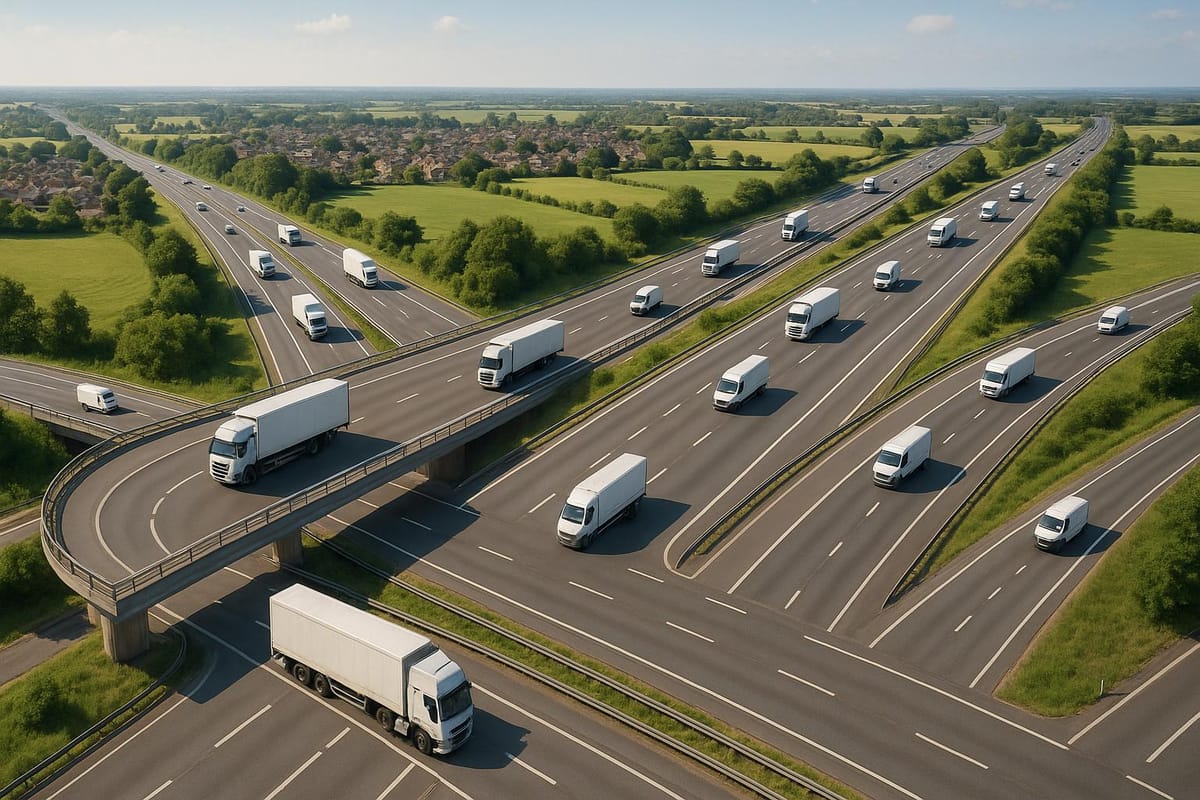
Fleet route optimisation is no longer a luxury - it’s a necessity for businesses managing deliveries in the UK. AI tools now offer precise, real-time solutions to challenges like traffic congestion, regulatory compliance, and fuel costs. Here’s what you need to know:
- Key Features: AI tools recalculate routes in real-time, use predictive analytics to prevent delays, and integrate with telematics for accurate tracking.
- Benefits: Reduced mileage, lower fuel costs, improved delivery accuracy, and compliance with UK-specific rules like ULEZ.
- Top Tools:
- GRS Fleet Telematics: Affordable (£7.99/month), real-time tracking, dual security trackers.
- Descartes Systems: Handles large fleets, integrates with ERP/CRM systems.
- Route4Me: Simple, fast, ideal for small to medium fleets.
- Samsara: Combines GPS tracking with AI for all fleet sizes.
Quick Comparison
| Platform | Best For | Starting Cost | Unique Feature |
|---|---|---|---|
| GRS Fleet Telematics | UK-specific needs, security | £7.99/month | Dual-tracker security system |
| Descartes Systems | Large fleets | Custom pricing | Complex scheduling algorithms |
| Route4Me | Small/medium fleets | Custom pricing | Quick multi-drop route planning |
| Samsara | All fleet sizes | Custom pricing | Advanced GPS + AI integration |
AI-driven tools are transforming fleet management, offering measurable savings and operational efficiency. For UK businesses, platforms like GRS Fleet Telematics provide tailored solutions to navigate local challenges.
AI & Machine Learning Use Cases for Route Optimisation
Key Features of AI Route Optimisation Tools
When choosing AI-powered route optimisation tools for your fleet, certain features can dramatically improve operations. These functionalities address the specific challenges of UK fleet management, from navigating congested urban areas to dealing with unexpected disruptions.
Real-Time Route Recalculation and Dynamic Rerouting
One of the standout features of modern AI route optimisation tools is their ability to adjust routes in real time based on ever-changing conditions. These systems continuously process live traffic updates, weather changes, road closures, and delivery constraints to recalculate the quickest and most efficient paths.
When faced with accidents or roadworks, these tools provide instant alternative routes, helping minimise delays and cut fuel costs. This capability ensures deliveries remain on schedule while allowing fleets to adapt quickly to unforeseen challenges, improving both delivery accuracy and overall fleet performance.
For UK fleets operating in complex urban areas like Birmingham's ring road or Manchester's city centre, this adaptability is especially useful during rush hour or unexpected events. Advanced systems go even further by considering multiple factors simultaneously - delivery time windows, vehicle capacity, driver hours, and specific customer requirements - when recalculating routes. This ensures efficiency gains without compromising service quality or breaching regulations.
Predictive Analytics for Better Decision-Making
Predictive analytics elevate route optimisation from reactive adjustments to proactive fleet management. By combining historical data with real-time updates, these tools can forecast delays, anticipate vehicle maintenance needs, and predict traffic patterns before they disrupt operations.
For example, AI can identify peak congestion times, enabling managers to schedule deliveries during less busy periods. It can also flag potential vehicle breakdowns based on performance data, allowing proactive maintenance to prevent costly roadside emergencies.
This capability is particularly helpful for UK fleets during seasonal shifts, such as school holidays or winter months. The system learns which routes are likely to become problematic and which vehicles may require more frequent servicing. This forward-planning approach reduces unplanned downtime and prevents disruptions that could ripple through delivery schedules.
Additionally, predictive analytics can estimate fuel consumption trends, helping fleet managers budget more effectively and find opportunities to improve efficiency. Some systems even analyse driver behaviour, identifying potential safety risks before they escalate into incidents.
Integration with Business Systems and Telematics
The ability to integrate seamlessly with existing systems determines whether an AI route optimisation tool becomes a game-changer or just another isolated platform. Effective tools connect with telematics, ERP, and CRM systems to provide a comprehensive view of operations.
When linked to telematics, these tools access real-time vehicle data, including location, driver behaviour, and fuel usage. This integration enhances route planning accuracy and ensures decisions are based on actual vehicle capabilities and constraints.
Integration also extends to customer-facing systems. Modern AI tools can provide precise delivery ETAs and automate notifications, reducing administrative workload while keeping customers informed throughout the delivery process. For UK businesses, compatibility with local compliance systems is crucial. Tools that integrate with telematics providers can monitor regulatory violations - like breaches of UK driving hours rules - and alert fleet managers automatically.
The most advanced platforms offer two-way communication between managers and drivers in real time. They also generate automated reports on fleet metrics with minimal effort, making it easier to track performance. This level of connectivity transforms route optimisation from a standalone function into a core component of overall business operations.
According to DispatchTrack, businesses using these tools report at least a 50% reduction in the time spent routing.
Ultimately, the best tools should complement existing workflows, enhancing the expertise of dispatchers rather than replacing their industry knowledge. This seamless integration lays the groundwork for addressing scalability challenges in larger fleet operations.
GRS Fleet Telematics: AI-Driven Route Optimisation for UK Fleets
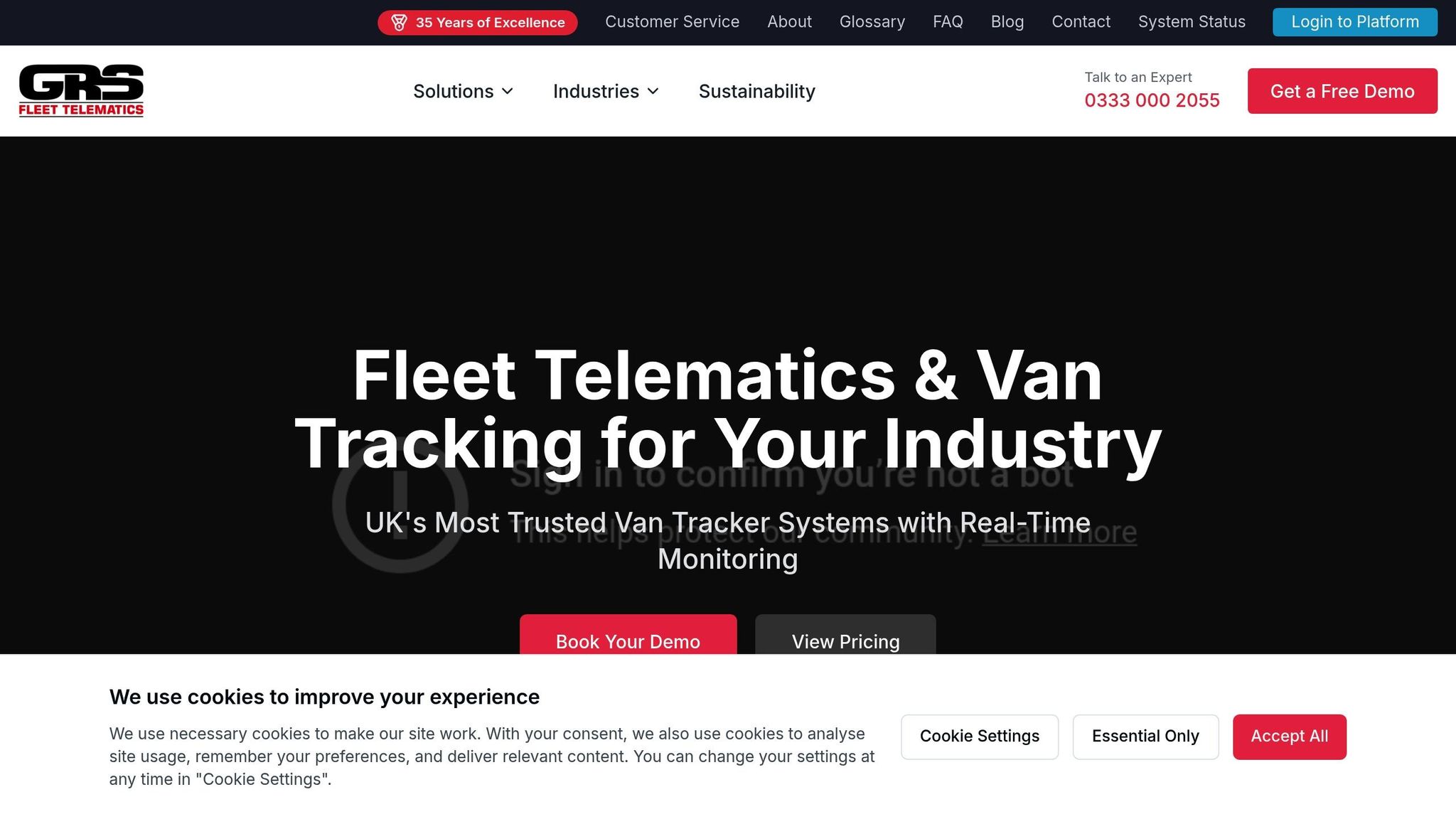
GRS Fleet Telematics is specifically designed for UK fleets, combining AI-powered route planning with advanced security measures. From navigating congested cities to handling rural delivery challenges, the platform addresses the unique needs of UK fleet operators while ensuring compliance with local laws and regulations.
Route Planning and Real-Time Tracking
Using AI algorithms, GRS Fleet Telematics analyses traffic patterns, delivery schedules, and vehicle conditions to create efficient, dynamic routes. The system recalculates routes as needed, ensuring smooth operations tailored to the demands of UK roads.
The platform also offers real-time tracking, allowing operators to monitor vehicle locations and respond quickly to delays. This transparency improves reliability and customer satisfaction while helping fleets navigate busy urban areas during peak times or adjust to unexpected issues like roadworks or bad weather. Seamless integration with existing workflows further enhances operational efficiency, and its route management features naturally contribute to improved vehicle security.
Dual-Tracker Technology for Security
Security is a standout feature of GRS Fleet Telematics, thanks to its dual-tracker system. It combines a hardwired GPS tracker, professionally installed and powered by the vehicle, with a hidden Bluetooth backup tracker placed discreetly. This two-layer setup makes it difficult for thieves to disable both devices, ensuring uninterrupted monitoring.
This robust security system boasts a 91% recovery rate for stolen vehicles, helping businesses minimise financial losses and lower insurance risks. Additional features include immobilisation to prevent unauthorised engine starts, tamper alerts, and geofencing notifications that trigger if a vehicle strays from its designated route or is moved without permission. In case of theft, a dedicated recovery team works around the clock, using both trackers to coordinate with law enforcement for quick retrieval. Together, these features provide business owners with greater peace of mind.
Scalable Solutions and Affordable Pricing
GRS Fleet Telematics offers flexible, budget-friendly plans starting at just £7.99 per vehicle per month. These plans include core features like AI-driven route optimisation, real-time tracking, and advanced security, with no hidden costs.
The platform scales easily, accommodating fleets of all sizes - whether a small team of vans or a large operation with hundreds of vehicles. Adding or removing vehicles is straightforward, and the cloud-based system eliminates the need for significant infrastructure investments. For larger businesses, white-label options allow custom branding for internal use or resale.
| Package | Hardware Cost | Features |
|---|---|---|
| Essential | £35 | Single wired tracker for real-time tracking |
| Enhanced | £79 | Primary tracker plus Bluetooth backup |
| Ultimate | £99 | Both trackers plus immobilisation capability |
Fleet branding comes with free installation, and a pay-per-recovery model eliminates upfront recovery fees. Businesses using GRS Fleet Telematics report an average monthly saving of £1,224.52 and an annual saving of £14,694.25, with a return on investment of 2,965% and a payback period of just 0.3 months.
With its blend of affordability, scalability, and AI-powered efficiency, GRS Fleet Telematics is an appealing option for UK businesses aiming to modernise fleet management without hefty upfront costs.
Top AI Tools for Fleet Route Optimisation
AI platforms are revolutionising how UK businesses manage fleet routes. By leveraging advanced algorithms, these tools showcase practical applications of AI in streamlining fleet operations.
Descartes Systems
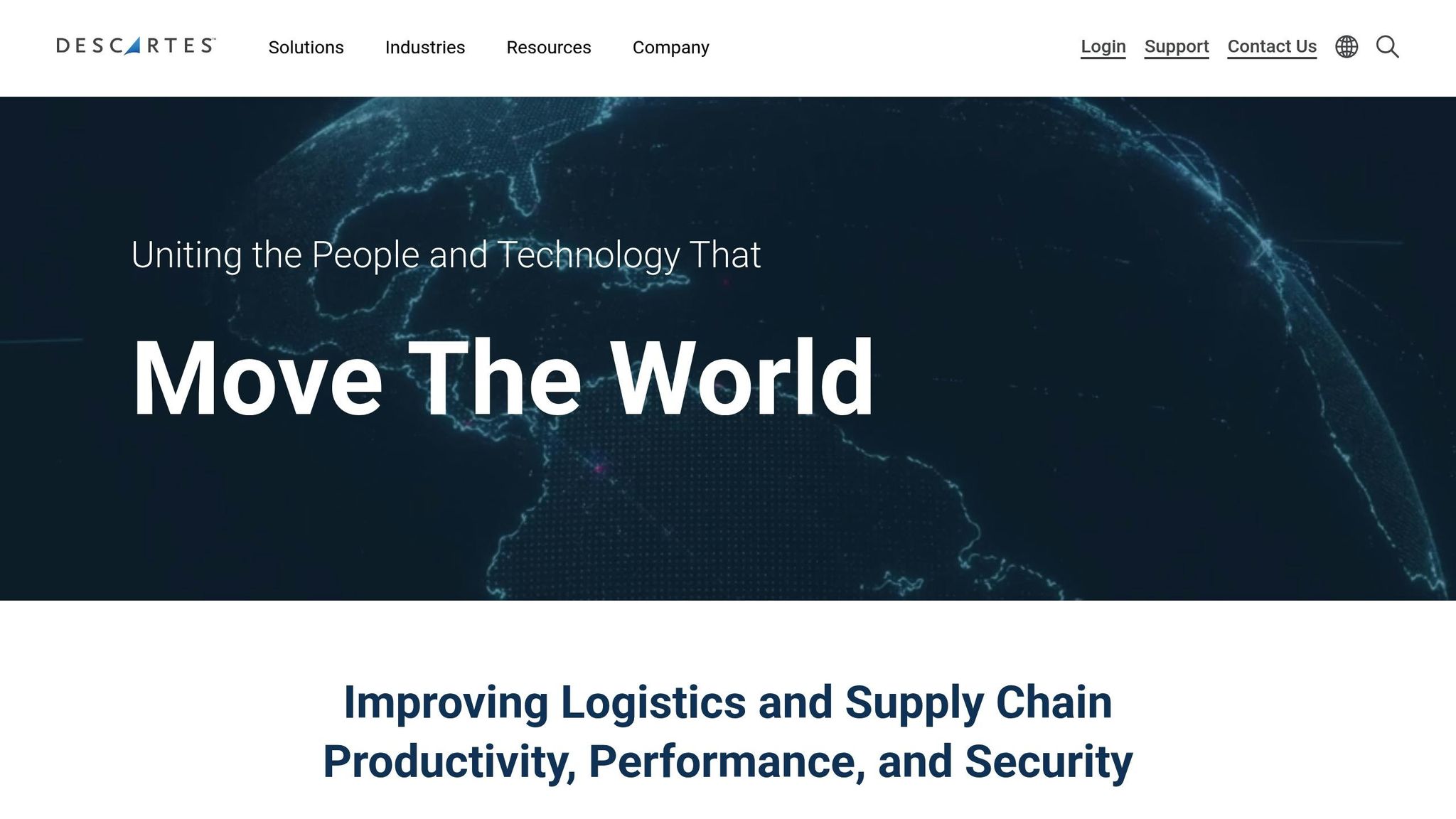
Descartes Systems is a standout choice for managing intricate scheduling across large-scale fleet operations. Its AI-driven algorithms efficiently optimise routes for hundreds of vehicles while accounting for critical factors like delivery windows, driver regulations, and vehicle capacity. This makes it especially useful for UK logistics companies handling extensive distribution networks. The platform processes vast amounts of data in real-time, supporting thousands of vehicles simultaneously. With a G2 rating of 4.6/5 from 1,467 reviews, it’s highly regarded for its reliability. Descartes Systems also integrates smoothly with ERP and CRM systems via APIs, ensuring seamless data exchange. It supports metric measurements, GBP currency formatting, and complies with UK-specific regulations.
Route4Me
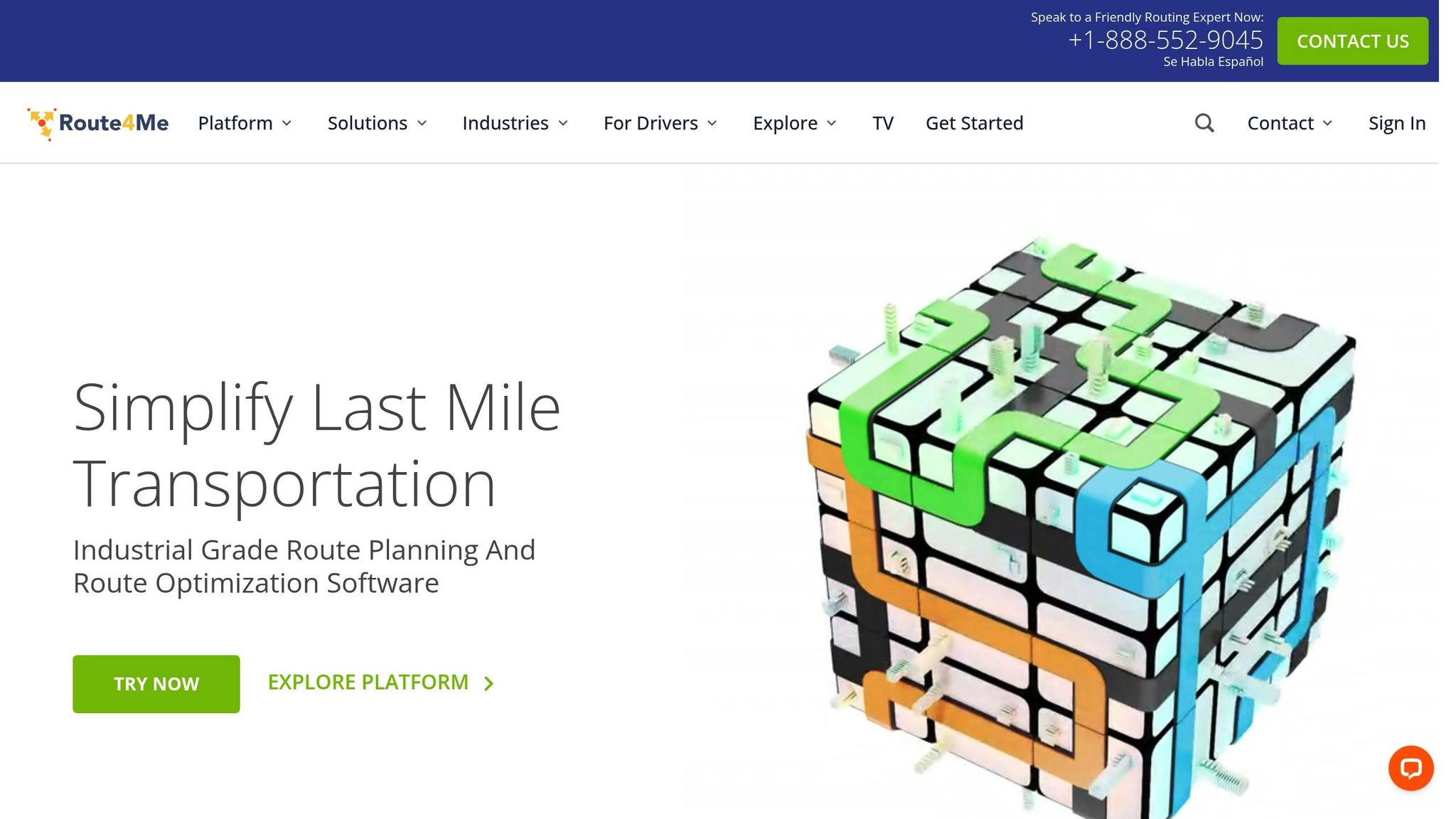
Route4Me is praised for its simplicity and speed, making it ideal for small to medium-sized fleets. Dispatchers can quickly create optimised routes, even for last-minute delivery requests, thanks to its intuitive interface. With a G2 rating of 4.6/5 from 102 reviews, users often highlight its ease of use and rapid deployment. The platform adapts in real-time to traffic changes, helping UK courier services minimise mileage and streamline multi-drop deliveries. Additionally, Route4Me integrates with popular telematics systems and dispatch management platforms, ensuring smooth data flow and improved operational efficiency.
Samsara
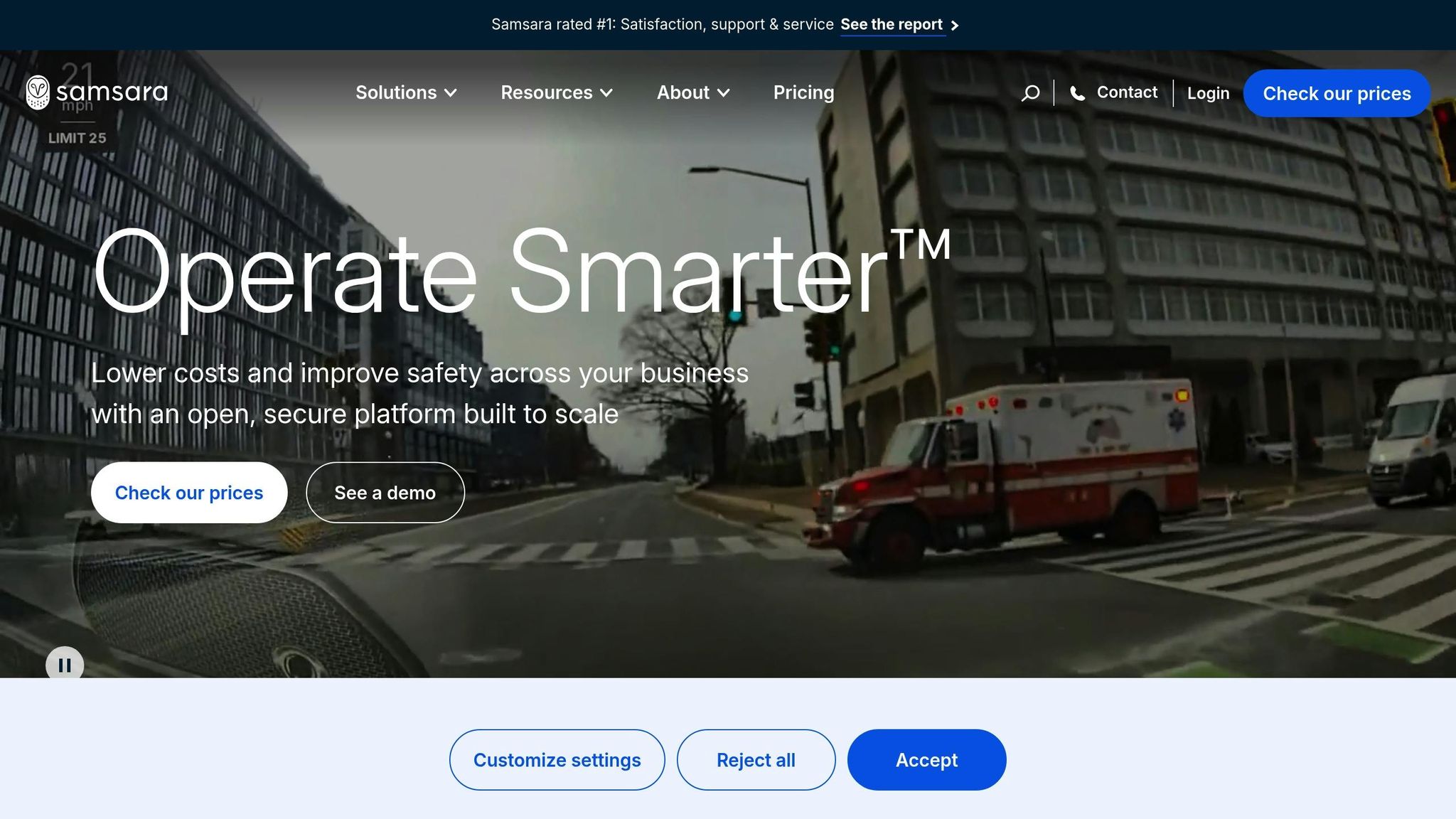
Samsara combines GPS tracking with AI-driven route planning for a comprehensive fleet management solution. Its integration with tools like Nextbillion.ai allows for complex, multi-vehicle routing scenarios directly within its dashboard - perfect for large UK delivery fleets. Samsara boasts a G2 rating of 4.6/5 from 1,140 reviews, with users consistently commending its tracking capabilities and seamless integrations. The platform handles high volumes of operational data effortlessly, even during peak periods. Its cloud-based design ensures scalability, allowing fleet operations to grow without requiring significant infrastructure upgrades. Like its counterparts, Samsara supports metric measurements and adheres to local compliance requirements.
| Platform | Core Strengths | Fleet Size Suitability | G2 Rating (2025) |
|---|---|---|---|
| Descartes Systems | Complex scheduling, large-scale reliability | Large fleets | 4.6/5 (1,467 reviews) |
| Route4Me | Simplicity, speed, multi-drop optimisation | Small to medium fleets | 4.6/5 (102 reviews) |
| Samsara | Real-time GPS, AI planning, integrations | All fleet sizes | 4.6/5 (1,140 reviews) |
These platforms highlight how AI-driven route optimisation can transform fleet management. By reducing miles driven and cutting down on route planning time, businesses can significantly improve efficiency. In fact, industry data reveals that implementing route optimisation can lead to over a 10% reduction in mileage and a 50–70% decrease in time spent on planning routes. Each platform offers distinct advantages tailored to different fleet sizes and operational needs, showcasing the growing potential of AI in logistics.
AI Scalability Challenges and Solutions in Fleet Operations
Building on integration features, scaling AI-powered systems in fleet operations introduces its own set of challenges. Successfully navigating these hurdles is essential for UK businesses aiming to expand their AI capabilities while maintaining efficiency and compliance.
Data Volume and Real-Time Processing
Large fleets generate massive amounts of data, and managing this flow can be a significant hurdle. Each vehicle continuously streams telemetry data, GPS locations, driver behaviour metrics, and delivery updates. This constant influx can overwhelm AI systems, particularly when real-time route recalculations are needed to meet the demands of modern logistics.
The problem becomes more pronounced as fleet sizes grow beyond a few hundred vehicles. High data volumes can lead to slower processing times and less accurate route calculations, undermining the benefits of AI implementation. To counter this, advanced platforms have developed solutions that ensure scalability without compromising performance.
Cloud-based systems using distributed computing, combined with edge computing for localised data processing, have proven effective. Platforms like Samsara and NextBillion.ai utilise these technologies to handle high data throughput while maintaining responsiveness. These systems can process data from thousands of vehicles simultaneously, achieving up to 98% accuracy in estimated arrival times (ETAs).
Additionally, robust APIs enable rapid data exchange, ensuring that businesses can sustain the real-time responsiveness their customers expect.
Integration with Existing Systems
Integrating AI route optimisation tools with existing IT infrastructures often presents a significant challenge. Many UK businesses rely on legacy systems, such as older ERP platforms, established CRM tools, and various telematics solutions that were never designed to work together seamlessly.
These older systems often require custom API adaptations to enable smooth data exchange, creating operational silos that trap valuable information. Overcoming this fragmentation is key to successful AI implementation.
Platforms like MaxOptra and Route4Me address these issues with open APIs and modular architectures, enabling seamless connectivity with existing business systems. Their ability to adapt to different data formats bridges the gap between outdated and modern technologies.
GRS Fleet Telematics takes this a step further with its white-label branding option, allowing businesses to integrate telematics functionality directly into their systems. By running pilot projects with a smaller subset of vehicles, companies can identify and fix integration issues early, ensuring smoother scaling over time.
Regional Compliance and Adaptability
Fleet operations in the UK face a unique set of regulatory challenges that can complicate AI deployment. From driver hours regulations and vehicle emissions standards to GDPR data privacy requirements, compliance is non-negotiable.
Furthermore, systems must accommodate UK-specific needs, such as metric measurements, GBP currency, and date/time formats. AI algorithms must also account for local operational factors, like London’s congestion charge zones or restrictions on heavy goods vehicles in certain areas.
To address these challenges, businesses should opt for platforms that prioritise regulatory compliance. These systems should automatically monitor driver hours, track emissions standards, and generate real-time compliance reports. Regular software updates are essential to keep pace with evolving regulations.
GRS Fleet Telematics exemplifies this UK-specific approach by offering features tailored to local businesses. For example, its dual-tracker technology achieves a 91% recovery rate for stolen vehicles, and its pricing starts at just £7.99 per month. These features not only ensure compliance but also enhance operational efficiency.
By choosing platforms with automated compliance monitoring and the flexibility to adapt to changing regulations, businesses can scale their operations without constant manual intervention or system adjustments.
| Challenge Area | Impact on Scaling | Recommended Solutions |
|---|---|---|
| Data Volume | Slower processing, reduced accuracy | Cloud-based platforms, edge computing |
| System Integration | Operational silos, data fragmentation | Open APIs, modular architecture, pilot testing |
| Regional Compliance | Regulatory violations, operational restrictions | UK-specific platforms, automated compliance monitoring |
Solving these challenges with scalable systems, seamless integration, and automated compliance tools can lead to measurable benefits, such as reducing daily mileage by up to 20%.
Conclusion
AI-driven route optimisation is revolutionising fleet operations across the UK, delivering noticeable savings in costs and mileage while boosting overall efficiency. Features like real-time recalculations, dynamic rerouting, and predictive analytics are helping businesses achieve measurable results. For example, Metro Cash and Carry managed to cut delivery expenses by 13%, and some companies have reported reductions in daily mileage of up to 20%.
The key to maximising these benefits lies in combining advanced AI tools with seamless telematics integration. This ensures smooth data exchange and rapid adaptation to operational demands. Such integration is especially vital for UK businesses that must navigate complex regulations, including driver hours compliance, emissions standards, and GDPR data privacy rules.
Among the solutions tailored for UK fleets, GRS Fleet Telematics stands out. It offers a powerful mix of AI-based route optimisation and robust fleet management tools. With dual-tracker security technology and pricing starting at just £7.99 per month, GRS delivers on affordability, flexibility, and security. Its real-time tracking, intelligent route planning, and fuel efficiency insights empower businesses to optimise operations while adhering to UK regulatory standards. This UK-focused approach ensures businesses stay competitive while meeting operational and legal requirements.
As the industry evolves, adopting AI-powered route optimisation is becoming increasingly important. Its ability to lower fuel usage, improve delivery reliability, and enhance fleet performance makes it an essential investment for future-ready fleet operations in the UK.
FAQs
How can AI tools help UK businesses comply with regulations like ULEZ and driving hours?
AI tools, like those offered by GRS Fleet Telematics, are proving essential for UK businesses aiming to navigate local regulations effectively. For instance, they provide route optimisation, helping vehicles steer clear of unnecessary journeys through Ultra Low Emission Zones (ULEZ). This not only cuts down on emissions but also helps businesses save on ULEZ charges.
On top of that, these tools include driver monitoring features that track working hours. This ensures drivers stick to legal limits on driving times and rest breaks, keeping companies compliant. Plus, it encourages safer driving habits and improves overall efficiency in operations.
What should I look for in an AI route optimisation tool for managing a small to medium-sized fleet?
When deciding on an AI-powered route optimisation tool for a small to medium-sized fleet, focusing on features that boost efficiency and ensure security is key. GRS Fleet Telematics delivers van trackers equipped with real-time tracking, driver behaviour monitoring, and in-depth fleet analytics to help simplify and improve your operations.
What sets them apart is their advanced dual-tracker technology, which offers top-tier security and boasts a 91% recovery rate for stolen vehicles. On top of that, their solution includes a user-friendly mobile app for easy fleet management and round-the-clock customer support, keeping your business connected and secure at all times.
How does predictive analytics in AI help fleet managers make better decisions?
Predictive analytics in AI equips fleet managers with the ability to anticipate future scenarios by analysing historical data alongside real-time inputs. This capability supports smarter route planning, helping to save fuel and cut down delivery times.
By spotting patterns - like recurring traffic bottlenecks or signs of vehicle wear - predictive tools can address potential issues before they escalate. This not only helps to avoid delays but also keeps maintenance costs in check. With these insights, businesses can make informed, proactive decisions that enhance fleet performance and boost customer satisfaction.
